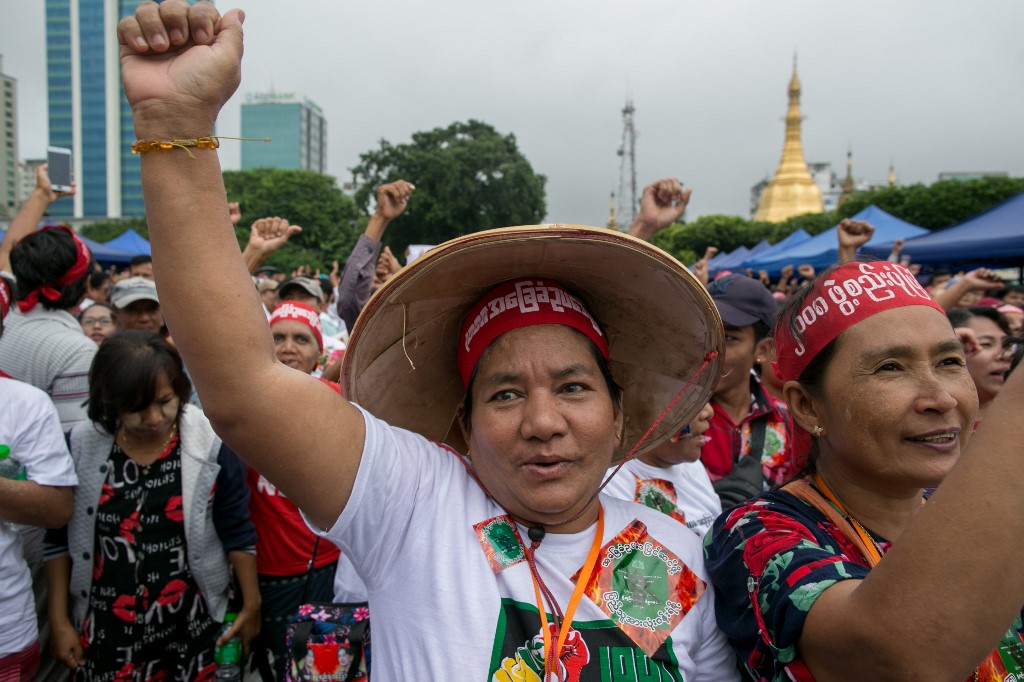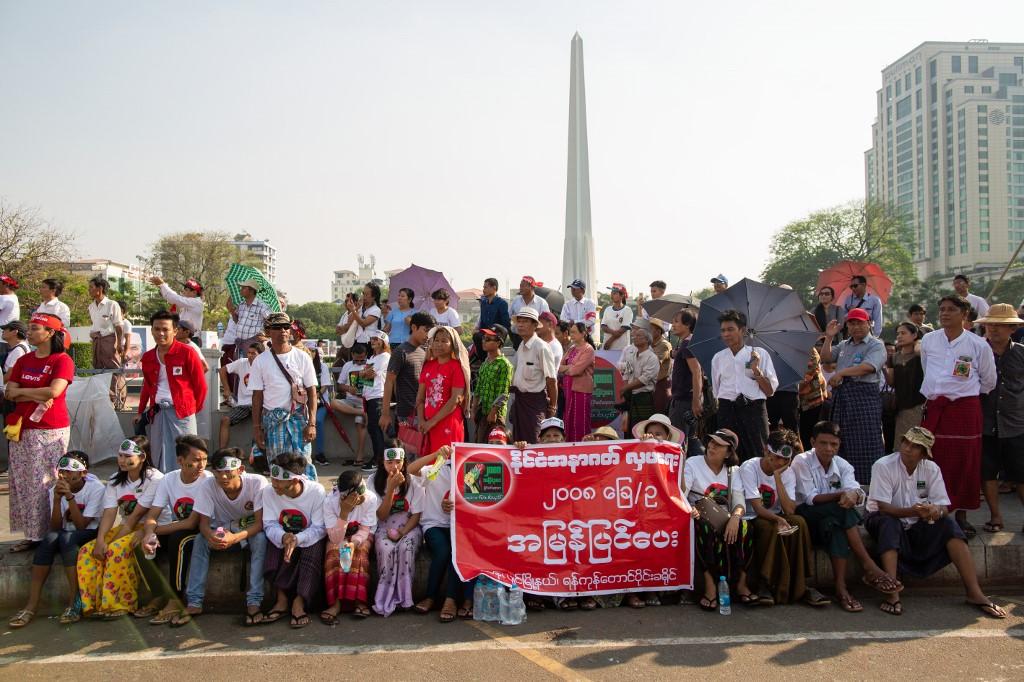
State Counsellor Aung San Suu Kyi’s quest to prise power from the military by amending the constitution has entered a new phase, and it’s one with a lot of paperwork, reports news outlet Myanmar Now.
After almost five months of closed-door meetings, a committee set up to propose changes circulated a hefty document among MPs this week that is about as thick as the constitution itself.
It details more than 3,700 proposals from 13 different political parties. They range from symbolic tweaks to language to changes that would mark a radical shift in the balance of power between the government and the generals.
The latter seem unlikely to go anywhere just yet. Military MPs refused to submit any proposals despite being on the committee, and have objected to the committee since its formation in February, claiming it breaches constitutional rules.
While the military is widely expected to veto any changes that threaten its power, observers say the National League for Democracy’s efforts will at least show voters they tried ahead of next year’s election, and enable them to blame their failure on the military.
Myanmar Now presents some of the most striking suggestions from the committee, which will soon be up for debate in parliament:
Let Suu Kyi be president
Section 59f does not explicitly name Aung San Suu Kyi, but its prohibition on anyone with a foreign spouse or children becoming president is widely seen as a means of preventing her from taking the top role.
This section has stirred some of the most passionate debate, with NLD supporters viewing it as an attack on their favourite leader while nationalists argue it is necessary to protect Myanmar from outside influence.
Unsurprisingly, the NLD suggested abolishing this section, a call that was echoed by the Shan Nationalities League for Democracy (SNLD) and the National United Democratic (NUD) party.
The ruling party remained silent, however, on a clause concerning the role of the first Vice President. Section 60b (iii) gives the military the power to appoint one of two VPs. Several smaller parties from the Rakhine, Shan, Zomi and Ta’ang groups called for it to be scrapped.
Get the military out of parliament…eventually
Sections 109b, 141b, and 161d allow the military to appoint MPs to 25 percent of all seats in national and local parliaments.
The Arakan National Party (ANP), the SNLD, the Mon National Party (MNP), and the NUD have proposed changing this to get rid of military MPs outright.
The NLD, meanwhile, has taken a more cautious approach that might be seen as an attempt to show it is serious about stability and a smooth transition of power.
The party wants to gradually reduce the number of military MPs until eventually getting rid of all of them in 2035.
The first stage would be to reduce their share of seats to 15 percent after the 2020 election. That would then drop to 10 percent after 2025, 5 percent after 2030 and zero for the election after that.
While it might well be an attempt to appease the generals, in practice the gradual phase-out would largely mean the same thing as getting soldiers out of parliament all at once: the military would lose its veto over constitutional changes.
Get rid of the military’s veto
Any change to the constitution requires the approval of more than 75 percent of MPs across both houses, and there are 94 sections of the charter that also need to be approved in a referendum in which at least half of all eligible voters participate.
The NLD wants to change that so that amendments require approval from just two-thirds, or 66 percent, of MPs. The party now has 58 percent of all seats in parliament, and 78 percent of all elected seats.
Combined with their proposal to reduce the proportion of military MPs to 15 percent, this change could conceivably give the NLD full power to change the constitution (minus those sections that also need a public vote, and assuming they don’t suffer major losses in future elections).
Allow civilian oversight of armed forces
The NLD and the ANP have both proposed abolishing section 338, which states that “All the armed forces in the Union shall be under the command of the Defence Services.”
The SNLD meanwhile has proposed amending the section to bring armed forces “under the command of the elected civilian government under any circumstances.”
The NLD also wants to abolish section 339, which states: “The Defence Services shall lead in safeguarding the Union against all internal and external dangers.”
Again, the SNLD has opted for an amendment, rather than scrapping the section, proposing that the purpose of the Defence Services should be to protect Myanmar from external threats only, and advising that the number of people in the military be kept at under 0.5 percent of the total population.
Abolish or reform the National Defense and Security Council
The constitution stipulates that a body stacked with military appointees, including the commander-in-chief, will have control over key security issues.
The National Security and Defense Council is charged with taking power in a state of emergency and approving the use of conscription during war. It also recommends prisoners to be pardoned in presidential amnesties.
The ANP has proposed scrapping the council altogether by abolishing section 201, a move which would likely give the president more executive power in military matters.
The NLD, NUD and SNLD want to keep the council but amend section 201 so there are fewer military members.
Military-appointed ministers have to ditch uniforms before joining cabinet
Smaller parties like the ANP, the SNLD and NUD want to get rid of a clause that allows the military to appoint the ministers for defense, home affairs and border affairs.
But the NLD has ignored section 232b (ii), which deals with the appointments, and has instead proposed changing a clause that says military appointees are not required to retire from service before becoming ministers.
Critics might argue that that would essentially leave the three powerful ministries in the hands of the generals while giving them a veneer of civilian control.
Abolish courts martial
The Mon National Party has proposed abolishing courts martial by scrapping section 293b, which details the military’s powers to hold private trials. But it seems unlikely to gain any support: no other party has suggested any changes to this clause.
No more discipline in our democracy, thanks
Other suggestions seem to be more about aesthetics or symbolism than changing the balance of power. The ANP and other parties want to change the official name of the country from the “Republic of the Union of Myanmar” to the “Democratic Federal Union of Myanmar.”
The SNLD, which submitted over 1,110 proposals, far more than any other party, made clear it had combed every detail when it suggested changing the title of chapter 7 from “Defence Services” to “National Security and Defence.”
The NLD meanwhile, wants to ditch the words “disciplined” and “multi-party” from the list of adjectives chosen to describe Myanmar’s “democratic system” in section 6d of the charter’s basic principles.
The former word signals the military’s desire to maintain a role in politics, while the latter might hint at a political system where the NLD doesn’t command a supermajority in parliament.
Smaller parties including the ANP and the SNLD want to ditch “disciplined” but, understandably, hang on to “multi-party”. And to be fair to the NLD, they opted to keep the inclusive qualifier a bit lower down, in section 7.
The ruling party has also proposed a design for a new national flag that harks back to the days before Ne Win seized power in a coup.
So what’s next?
A total of 122 MPs have signed up to debate the amendments, a process which is expected to start next week.
Of those, a disproportionate 78 are military-appointed MPs, which suggests that the Tatmadaw plans to use the debate to make its views about this whole process well-known.


